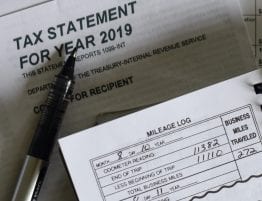
What are the Consequences of Back Tax Debt?
When it comes to tax debt, procrastination can have serious consequences. Unfortunately, many people fail to take the time to do their taxes or, worse, let them lapse and end up dealing with the repercussions, which could involve legal proceedings. Understanding the risks involved in not addressing back taxes and how and when to call a tax professional can help is essential.
First and foremost, when you put your taxes on the back burner, you may find yourself owing more than you anticipate. Because taxes are subject to interest and penalties, and the longer taxes are left unpaid, the money owed can quickly snowball, making it difficult to pay off.
In addition to owing more money, failing to settle back taxes can result in wage garnishment, bank levy, or a lien being placed on the individual’s property. So, any money or property owned by the individual can be seized to pay the taxes owed. This can have a devastating effect on an individual’s financial stability and can put them in a difficult financial situation.
Finally, failing to file your back taxes can also result in criminal charges. The IRS has the authority to take action against individuals who don’t file their taxes, which could involve fines, jail time, or both. It’s important to note that this kind of prosecution is rare, but it is possible and should be taken seriously.
Fortunately, there are steps that individuals can take to remediate their tax debt before facing harsh IRS penalties and interest. Here are four standard options that can help you with tax relief and how to file back taxes.
Are you struggling with your taxes this season? Get ahead on what you owe by contacting us to speak with one of our reliable and experienced tax attorneys today.
Four Options to Address Back Tax Debt
1. IRS Payment Plans for Back Tax Debt
The IRS offers several payment plans to help you get back on track. Understand that the IRS wants to work with you. The agency wants to help you pay off your debt in a manageable way. The IRS may be the government agency that collects taxes, but it wants to help you.
One of the most popular payment plans is the installment agreement. This agreement between you and the IRS allows you to pay your tax debt in monthly payments over a period of time. To qualify for an installment agreement, you must meet specific criteria, including the ability to pay your debt within the time frame you are requesting. Your monthly payment amount is determined by your income and the type of tax debt you owe.
2. Apply for an Offer in Compromise
Another option is an offer in compromise. (OIC) This agreement between you and the IRS allows you to settle your tax debt for less than the total amount you owe. To qualify for an offer in compromise, you must demonstrate that you cannot pay your taxes in full due to financial hardship.
The IRS may also allow you to defer your taxes if you can show that you cannot pay them now. This option is only available in certain circumstances, such as if you are unemployed, have experienced financial hardship, or are in the military.
The application process is lengthy and complex and requires detailed information about your financial situation. Once you’ve settled, you must pay the compromised debt within a very short time span. Therefore, if you are considering applying for an OIC, it is crucial to understand the requirements and process associated with the program. Contact a qualified tax professional if you have any questions or need assistance.
3. Currently Not Collectible Status
The term “Currently Not Collectible” (CNC) might sound like a scary phrase that has to do with money, but in reality, it’s something that many people find themselves in every day. This status is one of the options available to people who owe money to the IRS, and it can be a great way to help manage your taxes and get back on track.
Not Collectible (CNC) is another way for taxpayers to resolve their tax debt without paying the whole amount up front. When taxpayers are granted CNC status, the IRS agrees to suspend the collection actions and stops any attempts to collect the money owed. However, this does not mean that the debt is forgiven; it just means that the IRS knows that the taxpayer cannot pay their debt currently due to their financial situation.
To qualify for CNC status, taxpayers must prove to the IRS that they cannot pay the amount due and must provide evidence of financial hardship, such as proof of income, expenses, and assets. The IRS will review this information to determine if the taxpayer is eligible for CNC status. The IRS also considers other factors, such as age and health, when determining if the taxpayer is eligible for CNC status.
The primary benefit of CNC status is that it allows taxpayers to avoid collection actions, a benefit for individuals already struggling with their finances. Additionally, CNC status can help protect a taxpayer’s credit score since the IRS will not pursue collection actions while the taxpayer is in CNC status.
However, there are also some drawbacks to CNC status. The primary one is that the taxpayer is still responsible for the tax debt, and interest will continue to accrue while the taxpayer is in CNC status. Additionally, the IRS can revoke CNC status at any time and begin collection actions if they see that your financial situation has improved.
Not sure which option is relevant to your situation? We’re here to help. Contact us to speak with one of our reliable and experienced tax professionals.
4. Why Hiring a Tax Professional is Your Best Option
Our clients often come to us feeling hopeless and needing clear direction on tackling their back tax debt. The truth is the IRS is a very powerful agency, and they have a vast array of resources to ensure taxpayers pay what they owe. This is why hiring a tax relief company is best to help you address your back taxes. Here are some of the top reasons why you should consider hiring a tax relief company to help you with your tax debt:
Professional Assistance
The best tax relief companies are staffed by seasoned professionals with extensive knowledge and experience in dealing with the IRS. They understand the tax code, the various tax laws, and the different strategies to reduce your overall tax burden and give you the peace of mind you deserve.
Negotiations
Tax relief companies can also help you negotiate with the IRS to reduce your back taxes. They know the IRS rules and regulations and can also work to find ways to lower your tax bill—a tremendous advantage when managing your back taxes.
Expertise
Tax relief companies have the expertise and knowledge to represent you in dealings with the IRS. They know the IRS regulations, they can help you navigate the bureaucracy, and they can also work to find solutions that can help you reduce your overall tax bill.
Tax professionals can also help individuals understand their rights and the options that are available to them. They can help you determine the best way to proceed, whether it be negotiating a payment plan, filing an Offer in Compromise, or appealing a decision made by the IRS.
When dealing with back taxes, it is vital to seek professional help as soon as possible. A good tax relief company can help you get your taxes taken care of quickly and efficiently, leaving you with less financial burden to worry about so you can get back to caring for your family.
At Justice Tax, we have helped thousands of hardworking Americans with their tax needs and tax issues. We specialize in tax preparation and tax relief for 1099 independent contractors, self-employed individuals, and owner-operators. You can learn more about our services or contact us today for a free consultation.








